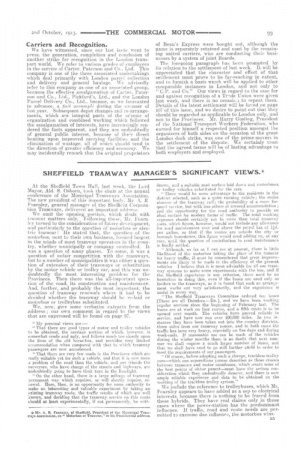At the Sheffield Town Hall, last week, the Lord Mayor,
Page 3

If you've noticed an error in this article please click here to report it so we can fix it.
Aid. S. Osborn, took the chair at the annual conference of the Municipal Tramways Association. The new president of this important body, Mr. A. R. Fearnley, general manager of the Sheffield Corporation Tramways, delivered an important addres:i. We omit the opening portion, which deals with tramcar matters only. 'Following these, Mr. Fearnley turned to the consideration of future .de' elopnient, and particularly to the question of motorbus or electric tramcar ? He stated that, the question of the motorbus, next to their own business, loomed largest in the minds of most tramway operators in the country, whether municipally or company controlled. It was a question of many phases. To some, it was a question of unfair competition with the tramwa.ys, but to a number Of municipalities it was either a question of extension of their tramways or substitution by the motor vehicle or trolley car, and this was undoubtedly the most interesting problem for the Provinces. Then there was the all-important question of the road, its construction and maintenance. And, further, and probably the most important, the question of tramway renewals where it. had to be decided whether the tramway should be re-laid or motorbus or trolleybus substituted.
We, now, give some verbatim extracts from the address ; our own comment in regard to the views that are expressed will be found on page 97.
"My personal views are:— " That there are good types of motor and trolley vehicles to be obtained, the carriage portion of which, however, is somewhat crude and ugly, and follows much too closely upon the lines of the old horse-bus, and provides very limited accommodation when compared with that to which tramway passengers are now accustomed.
" That there are very few roads in the Provinces which are really suitable yet for such a vehicle, and that it is now more a problem of the road than the vehicle, and our friends the surveyors, who have charge of the streets and highways, are undoubtedly going to have their turn in the limelight.
"On the other hand, there is a large mileage of tramway permanent way which requires, or will shortly require, re• neWal. Here, then, is an opportunity for some authority to make an interesting and valuable experiment by taking an existing tramway route, the traffic results of which are well known, and deciding that the tramway service on this route should at least experimentally, if not permanently, be with
drawn, and a suitable road surface laid down and motorbuses or trolley vehicles substituted for the cars.
" There would be some advantage to the residents in the district selected, such as a quiet running vehicle; the entire absence of the tramway rail; the probability of a more frequent service, but with less saloon or covered accommodation ; and the opportunity for the road authority to provide an ideal surface for modern forms of traffic. The total working expenses should certainly not be more than total tramway costs, which figure, however, would not include any allowance for road maintenance over and above the petrol tax of ltd. per gallon, so that if the routes are outside the city or borough boundaries, this figure would need adding on, at any rate, until the question of contribution to road maintenance is finally settled.
" Although, so far as I can see at present, there is little likelihood of the motorbus taking the place of the tramcar for heavy traffic, it must be remembered that great improvements are likely to be made in the efficiency of the present vehicles I believe that it is most advisable for all our tramway systems to make some experiments with the bus, and if the Sheffield experience is any criterion, there need be no hesitation in doing this, even if the buses are used only as feeders to the tramways, as it is found that such an arrangement works out very satisfactorily, and the experience is useful in every way.
"The Sheffield Tramways Committee ordered ten buses [These are all Daimlers.—En.], and we have been working regular services since the beginning of February last. The buses are at work on four routes, and a fifth route is to be opened next month. The vehicles have proved reliable in service, and have now run over MAO miles. In two in stances they have been taken out into the country districts, three miles from our tramway routes, and in both cases the traffic has been very heavy, especially on fine days and during week-ends. If reasonable use can be made of the vehicles during the winter months there is no doubt that next summer we shall require a much larger number of buses, and that we shall have need to go still further afield in order to meet the requirements of our passengers. " Of course, before adopting such a change, trackless trolley cars—which one supercilious person describes as those crosses between tramcars and motor omnibuses, which retain none of the best points of either parent—must have the serious consideration which they undoubtedly deserve, and there is now ample reliable expedience and data to be obtained on the working of the trackless trolley system."
We include the reference to trolleybuses, which Mr. Fearnley appears to have added as a. sop to electrical interests, because there is nothing to be feared from these hybrids. They have real claims only in those cases where the power-station has the predominant influence. If traffic, road and route needs are permitted to exercise due influenri.i, the motorbus wins.


























